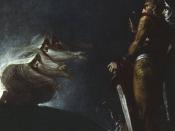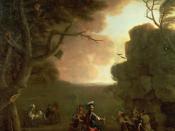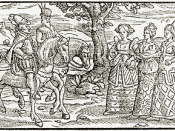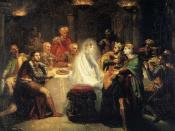In ShakespeareÃÂs play Macbeth, Macbeth hears multiple prophecies two of which say that he will become king and that the decendants of his friend Banquo will become kings. The extremely ambitious Macbeth then kills the current king in order to gain control of the throne. Once Macbeth is king he remembers the prophecy about BanquoÃÂs descendants and how the bloodline of Banquo will take the throne from his bloodline. Macbeth has a soliloquy in which he tells of his fear of Banquo, his feelings of dissatisfaction with the throne if his bloodline loses control, and of how he feels that his killing of the previous king only benefits the bloodline of Banquo. In this speech Shakespeare uses diction, imagery and various other literary devices to further develop the tone of the passage.
In this soliloquy Macbeth first speaks about his fear of Banquo. He says that Banquo is willing to take risks and he has a ÃÂdauntless temperÃÂ (3.1.54).
Dauntless is used to describe Banquo as a courageous enemy. ShakespeareÃÂs use of diction here expresses how Banquo is a cause of great worry to Macbeth and it also strengthens the worried tone of this part of the soliloquy. Shakespeare also uses a literary allusion to one of his own plays in order to add to the worried tone. Macbeth speaks of Mark Antony and Caesar. In ShakespeareÃÂs play Julius Caesar, Mark Antony brings down Brutus and his group of conspirators, who killed Caesar, out of loyalty to the murdered Caesar. Shakespeare uses this allusion to express MacbethÃÂs fear that Banquo may act against him out of loyalty to the murdered king Duncan.
Macbeth then moves to express his dissatisfaction with his new position because his bloodline will not keep the throne. He speaks of how the witches gave him nothing but a ÃÂfruitless crown/ And put a barren scepterÃÂ in his grip (3.1.63-64). This plant imagery is used to express the uselessness of his kingship unless he can pass it on to another. He tells of how his kingship will be ÃÂwrenched with an unlineal handÃÂ meaning that his position will be forcibly removed from Macbeth and his bloodline (3.1.65). The word wrenched expresses his unwillingness to give up the throne.
Macbeth them begins to tell of how his murdering of the previous king Duncan only benefits the line of Banquo and how he wants to try to destroy the bloodline of Banquo so that the prophecy wonÃÂt come true. He speaks of how the boodline of Banquo has put ÃÂrancors in the vessel of my peaceÃÂ meaning that the issue of Banquo has disrupted his peace and replaced it with bitterness and resentment. The use of the word rancors develops the tone of anger and resentment in this part of the soliloquy.
ShakespeareÃÂs use of literary devices to establish the tone helps the reader understand the emotion and meaning of Macbeth as this soliloquy progresses. The tone of the soliloquy evolves from fear to dissatisfaction to resentment. This speech shows the reader that Macbeth will stop at nothing to secure the throne to his bloodline. It also expresses how Macbeth as a person has changed drastically because the man who was originally scared about murdering the king is now perfectly willing to murder his friend.
___________________________________BibliographyShakespeare's Macbeth





